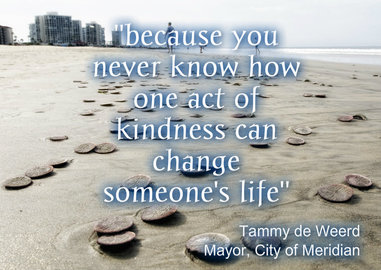|
The other day I read a Facebook post from someone who was expressing their horror and dismay at a product being sold by a large retailer. A product that seemed inappropriate for that retailer to be selling and marketing. The individual indicated that while they currently did not shop with this retailer, they would be sure not to until the retailers attitudes changed and this product was removed from their shelves and product line up. Now it is not important who the retailer was or what the product was, or even so much what any of the other details of the post are. What intrigued me, were the comments that were made about this post and the individuals intention to "boycott" the retailer. There were several that chided the poster for their naiveté suggesting that if they boycott every organization that sells something they don't like they wouldn't be able to shop anywhere. While this may be true, it is a sad representation of what I see as the "Small Standards" or "lowest common denominator" mentality that holds most people back from achieving their full potential. Why, when someone wants to make a stand for something good, are there throngs of people who will tell you why you can't or shouldn't? I don't have the answer. I just find it curious that when we aspire to greatness there are plenty of people who would rather tear us down, than lift us up. Sand Dollars Let me illustrate with a fictitious tale of a young lad who was found scurrying around the beach one morning during low-tide, picking up sand dollars and throwing them back into the ocean. The young lad was approached by an elderly gentleman, who was out for a leisurely stroll along the beach. The elderly gentleman inquired of the lad what it was that he was doing. The young lad responded cheerfully, to the elderly gentleman, that he was saving the sand dollars. To which the elderly gentleman, looking up and down the beach which was blanketed with sand dollars, kindly pointed out to the young man that he was wasting his time and that his efforts would not make a difference for so many sand dollars. Time is a resource, but not like any other. It is not a resource you can find, buy, store, or get back. It is finite, it cannot be reduced or increased. We exist within it. It is like a river rushing by, or washing over us. It can be like the wind, flying past you in great gusts. Whether a river or the wind, it consistently passes by us, whether we want it to or not. Unlike any other resource it is naïve to think we can manage time. Instead we engage with it as it fleetingly passes by. So why talk about managing time? Why not talk about watching time, or experiencing time, or engaging time. The term “time management” is a misnomer, but we constantly talk about “managing time” and “improving time management”. This may be the reason we all have problems with “time management”. We are inundated with “time management” articles, books, blogs, seminars, and webinars all touting ways to better manage time.
I submit that there are two forms of time engagement with varying degrees in between. Both are necessary, but vastly different. One extreme of engagement is structured and the other is unstructured. Have you heard the phrase “work hard and play hard”, if so this is a variation on that concept. Both provide a way to engage with time and get the most out of it. The level of intensity is up to you, the more intense the greater the result.
Do you find achieving your goals is like finding the pot of gold at the end of the rainbow we read about in St Patricks’ day poetry or lore of the Leprechauns?
If so, I’d like to offer a little Leprechaun poetri to turn your SMART goals into reality. We’ve all made them, those SMART goals that we end up forgetting about, beating ourselves up over, and wondering why we fail again and again to the point where we just quit making those goals. You know the goals that are Specific, Measurable, Attainable, Relevant, and Timed (SMART). Or, some variation on this. As we go through the steps, we agonize to make sure we include all of the elements and word it correctly. Then we watch and wait, and wait, and wait — but they never happen. Okay, I’m exaggerating. We go out and start working on it, but somewhere along the way something else, usually life, gets in the way and the goal is forgotten about. A smart man once said that the definition of insanity is “doing the same thing over and over and expecting different results” (that was Albert Einstein). You may say, yeah. I keep setting goals and I don’t achieve them, so why set goals, I mean that sounds like insanity. But is it really? I don’t think so. I think it is that we are only doing part of the same thing over and over. I suggest that you make SMART goals with POETRI. You ask what POETRI? Yes, that’s correct. I will assume you already know what SMART means for making goals (if not see three paragraphs above or for more details go to Wikipedia). So what does POETRI stand for, you ask? It stands for those things you need to make your goals happen. It is the Planning, Organization, Execution, Tracking, Rewards, and Improvement that will help you to achieve your goals (and maybe even find that pot of gold at the end of the rainbow). |
Ron Cornwell30 years of helping others achieve their full potential through the POETRI In Motion framework, an effective and agile approach to sustained success using effort efficiently CategoriesArchives |
POETRI In Motion
Coaching |
Knowledge, Skills & Abilities Training |
CompanySite Info |
© 2015-2016 Ron Cornwell, LLC. All rights Reserved | Meridian, ID 83646 | 208-830-7746 | ron@PoetriInMotion.com


 RSS Feed
RSS Feed
